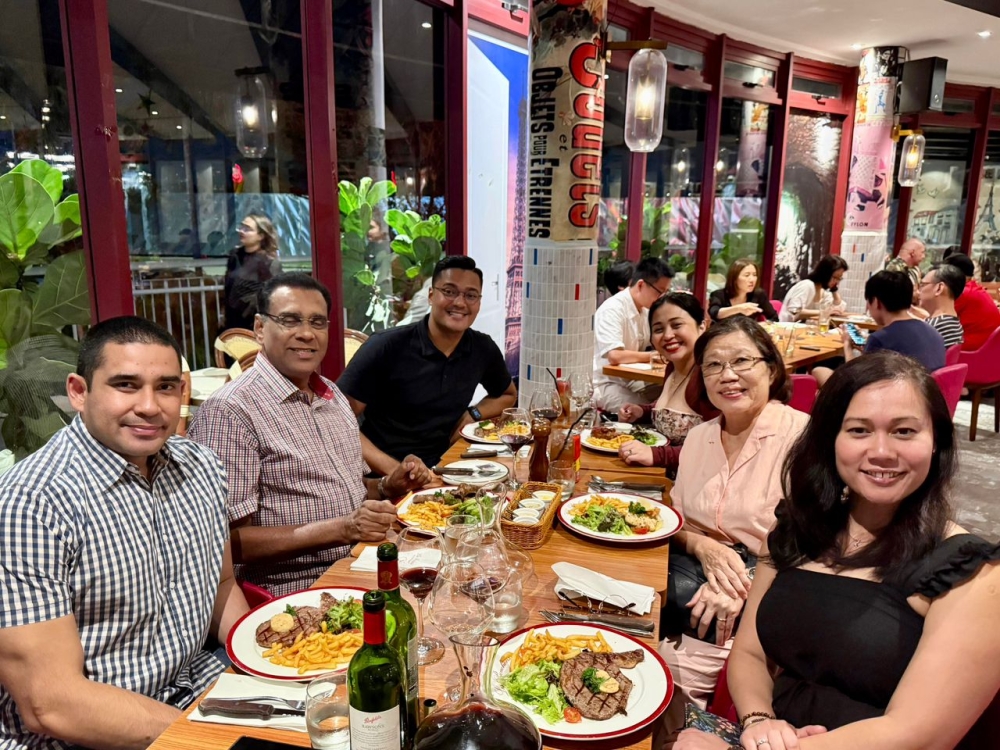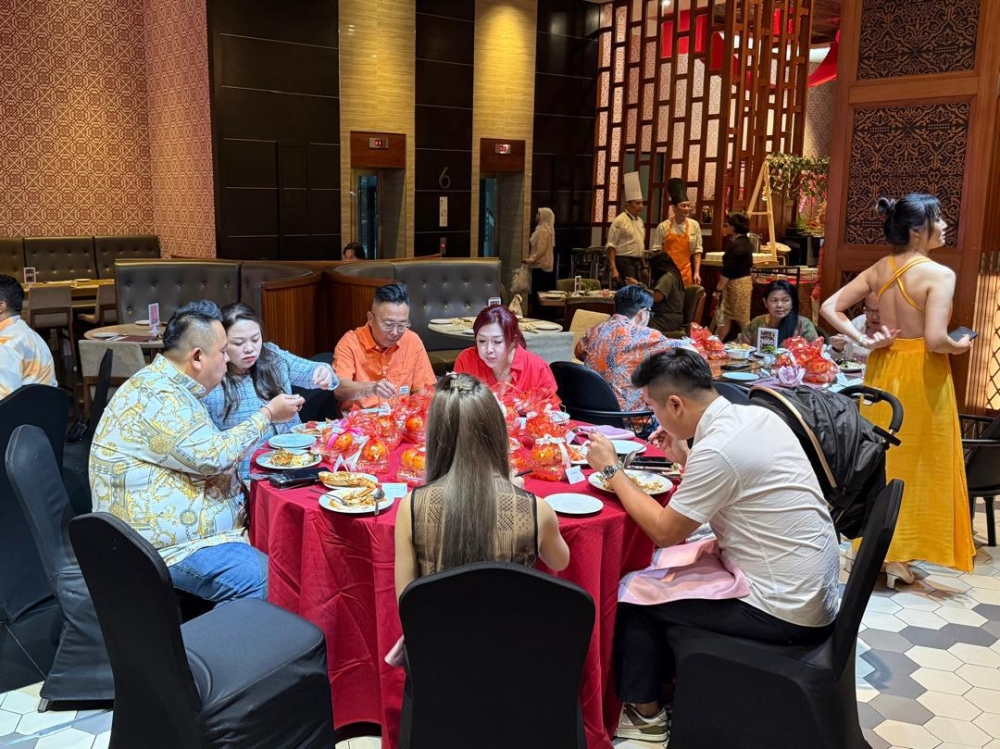
Cost, convenience and family: How JB became a CNY reunion dinner hot spot for Singaporeans

A file photograph shows a family tossing yee sang during their reunion dinner ahead of the 2024 Chinese New Year. — Bernama pic
Thursday, 23 Jan 2025 7:00 AM MYT
JOHOR BARU, Jan 23 — The reunion dinner on the eve of the Lunar New Year is a deeply ingrained tradition in the Chinese community, symbolising family unity, love, and the anticipation of a thriving year ahead.
This cherished occasion is celebrated worldwide, and for many Chinese families in Malaysia and Singapore, it is an essential moment to reconnect and bond with loved ones.
Traditionally, reunion dinners took place in hometowns, at a patriarch’s residence. A lavish spread of home-cooked dishes was prepared, with every member playing a part in the occasion.
However, as lifestyles evolve, more families are choosing the practicality and variety offered by restaurants, making dining out an increasingly popular option.
Doing things different
For 38-year-old Ting Feng, this year’s reunion dinner will mark a departure from the norm.
The Singaporean, who is self-employed, plans to celebrate in Johor Baru for the first time, bringing his family across the border for the festive occasion.
“Since it will be our first time celebrating away from Singapore, my wife and other family members have been supportive of the plan,” he said when contacted by Malay Mail.
“Their only concern will be the massive traffic congestion at the checkpoint that is common during festive seasons.
“So, I plan to have my reunion dinner with my family at the Trove Johor Baru due to the hotel’s close proximity to the Johor Causeway and since it’s our first time away from Singapore.”
Ting, who is planning a table for six to 10 family members, believes this decision is not only practical but also cost-effective.
He estimates a budget of S$500 (RM1,640) for the meal, an amount that would only cover five to six diners in Singapore.
“There is also a greater variety of food in JB. I might be biased, but I think JB’s food quality in general is good or even better than Singapore’s,” he said.
Ting, whose family has business interests in Johor under the Care Luxury Hotels and Resorts Group, added that the move makes sense for him as he has relatives in JB and values the opportunity to spend time with them during the extended holiday period.
“In the past, we would usually have our reunion dinner at home, but the preparation and cooking involved can be taxing.
“Honestly, I prefer to just dine out for convenience,” he added.
Strengthening family ties
For 27-year-old Bryan Nambiar, having the reunion dinner in JB is motivated by his desire to be with his parents, who reside in Iskandar Puteri, a short drive from the Causeway.
“Personally, my immediate family is the main motivation for me to cross the border into JB,” the product manager said.
This year, Nambiar plans a small gathering with his wife and parents at a local restaurant.
“I’m definitely looking forward to having the reunion dinner and spending the festive holidays with my parents. It’s a time where I can catch up and interact closely with them,” he told Malay Mail recently.
Nambiar comes from a mixed heritage family; his father is Malaysian Indian, and his mother is Singaporean Chinese.
Despite their diverse backgrounds, the family has always placed great importance on Lunar New Year celebrations and the reunion dinner.

Singaporean Bryan Nambiar (top left) with his parents and sibling during last year’s Christmas dinner at a restaurant in Johor Baru. — Picture courtesy of Ravi Nambiar
“In the past, we had our reunion dinners in Singapore, where my maternal grandmother was the matriarch. Growing up, the day before Lunar New Year was a major occasion,” he said.
Now, practicality has shifted the tradition across the border for the sake of his ageing parents.
Nambiar estimates spending around RM600 for a quality meal for four in JB, compared to S$250 (RM820) for a similar experience in Singapore.
“Even for me, travelling into JB can be time-consuming, due to the congestion at the checkpoints. But the cost savings make it worthwhile.”
Cherished moments
For 49-year-old Andrew Seah, a Singapore permanent resident, the reunion dinner is an annual tradition he wouldn’t miss, no matter the challenges.
“Travelling to get back to my parents’ home in JB from Singapore isn’t exactly smooth during the holiday period, especially towards the Lunar New Year.
“However, being at my family’s reunion dinner and spending the festive occasion with my parents is something I hold dear,” said Seah, who works in engineering sales.
Seah grew up in JB and finds the festive atmosphere there more vibrant compared to Singapore.
“I have always enjoyed celebrating the Lunar New Year in JB, especially with my parents still around,” he told Malay Mail recently.
He also highlighted the affordability and variety of options in JB, adding that a meal for six to eight people in JB costs around RM1,000, whereas a similar one in Singapore is about S$800 (RM2,625).
Convenience wins
Not everyone, however, is keen to make the cross-border journey.
Hannah Lee, a 77-year-old retired medical care assistant who is a naturalised Singaporean, prefers to stay in the city-state for her reunion dinner even though she still maintains close ties with her extended family in JB.

A family celebrates their reunion dinner at a restaurant. — Picture by Ben Tan
“It’s that time of the year where most people make a mad rush across the border.
“At my age, I tend to avoid travelling to JB during Lunar New Year or other festive periods as it can be stressful,” she said.
Lee, who was born in JB but spent her formative years in the Hougang area of Singapore, shared that she now celebrates the occasion with her husband and close friends.
“I will miss the braised pork and duck dishes that Teochews serve for the reunion dinner.
“About 10 years ago, I would make it a point to visit my siblings in JB for the reunion dinner, but the congestion and my age have made it a challenge,” she said.
Instead, Lee makes up for the missed reunion by visiting JB on the third or fourth day of the New Year.
“The traffic is better, and it is a chance to catch up with relatives.
“I usually make another trip before Chap Goh Meh to eat at my favourite restaurants and soak in the festive atmosphere as celebrations draw to a close,” she added, in reference to the 15th and final day of the Lunar New Year celebrations.
No comments:
Post a Comment